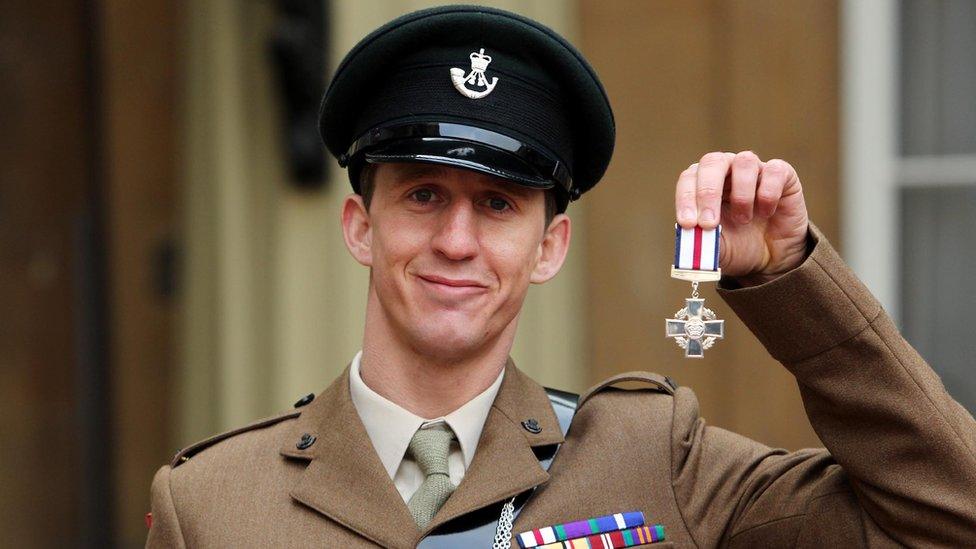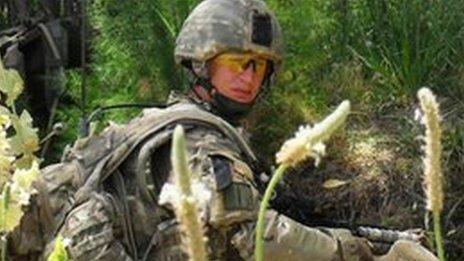Deacon Cutterham's medal collection sells for £140k
- Published

Sjt Deacon Cutterham was presented with his medal at Buckingham Palace in 2012
A soldier whose heroics in winning one of the highest military honours for bravery were called into question has sold his medal collection for £140,000.
Deacon Cutterham was awarded the Conspicuous Gallantry Cross for picking up and hurling away a Taliban grenade.
But some who served alongside him in Helmand Province, Afghanistan, have disputed what happened that day.
Mr Cutterham, who strongly denies their claims, said he was glad the medals would be going to a new home.
Some of his former colleagues in the 1st Battalion the Rifles chose to speak to the BBC after reading reports about Mr Cutterham selling his collection of seven medals at auction.
One said: "We didn't care if he wanted to tell people how brave he was. What we care about now is him making financial gain from this."
The medals were sold at auction at Dix Noonan Webb in London to a private collector in the UK.
Mr Cutterham, 37, from Bristol, joined the Army at 16 and served in Iraq and Afghanistan during a 19-year military career. He was medically discharged after developing PTSD.
The grenade incident happened in 2011 when, as Sjt Cutterham and serving in the 1st Battalion the Rifles, he was leading a patrol in Nahr-e-Saraj District in Helmand province, southern Afghanistan.
His medal citation for the Conspicuous Gallantry Cross - one level down from the Victoria Cross - reads: "The action itself was utterly courageous, carried out with composure and clarity of thought.
"Cutterham's gritty leadership and gallant act saved lives and inspired his men."
No-one disputes that a grenade did go off that day. Everyone on Mr Cutterham's patrol - and back at the patrol base - said they heard an explosion.
"We believe a grenade was thrown, but it was his," one of his former comrades told the BBC.
Another soldier, who says he carried out an equipment check when the patrol returned to base, claimed: "There was one grenade missing."
'I saved soldiers' lives'
In response, Mr Cutterham said he was "extremely disappointed" by the claims, adding that he strongly denied them.
"I'm just surprised. I can only hazard a guess that they are either jealous or envious," he said.
"The citation wasn't written by me, it was written by the commanders. The award is rigorously tested through several committees before being granted.
"I'm proud of the fact I saved those soldiers' lives. What if I had jumped the other side of the ditch and the grenade exploded and killed both those blokes? My name would have been mud."
He said he was "extremely privileged" to have been awarded the honour, and added: "I am pleased to see it will be going to a new owner in my lifetime. I am planning to use the money to support my family as they are now my focus."
A Ministry of Defence spokesman said: "Our service personnel display exceptional gallantry and courage while performing duties at home and abroad.
"Acts of courage that warrant an honour or award are rigorously scrutinised before being approved.
"If serving personnel have a grievance, there is a formal process for them to register their complaint through their chain of command, which would be looked into accordingly."
Several of the soldiers who spoke to the BBC said they did raise concerns at the time, but were told they were only doing so because they disliked Mr Cutterham.
Most of those who spoke to the BBC have admitted they disliked him.
- Published9 November 2020

- Published24 October 2020

- Published13 December 2012
